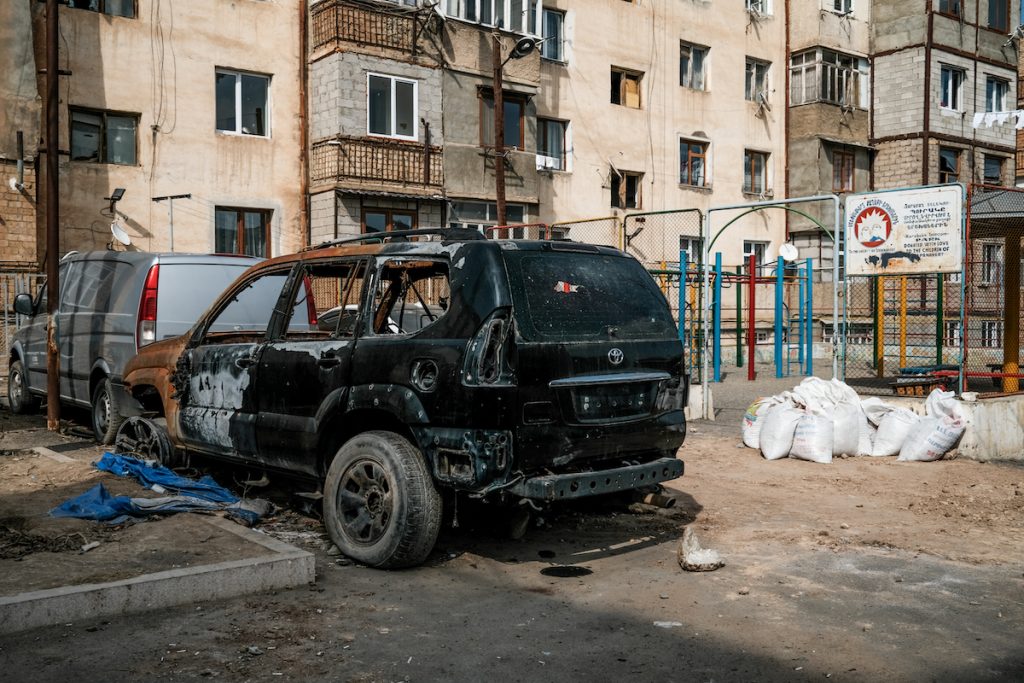Blog: introvert's notes from post-war Stepanakert
Stepanakert during and after the second Karabakh war
The author of this blog who prefers to remain anonymous resides in Stepanakert (in Azerbaijan the city is called Khankendi). They had been living there until the second Karabakh war (September 27 – November 10, 2020), left it for a short time during the war but came back and continue to live there now. They tell their share their notes from the post-war city in their blog for the Trajectory project.
“On the very first day of the war, Stepanakert, our beautiful capital built up with new glasshouses, turned into a front-line city with all its signs and attributes.

Most of the men immediately donned military uniforms. With weary faces, avoiding answering the questions about the situation at the front, they got into their cars and drove away – where hell went loose.
The women drooped and looked lost and collected their things to leave for evacuation. Not all of them, of course, but the majority. The children became quiet and looked into the sky with fear, mistaking flying birds for drones.
Then the city was filled with confused refugees from the war zone, with some bags in their hands, not believing in their newly acquired homelessness.
Many unorganized and uncontrolled “mobs” appeared in hotels (short for “mobilization” – that is how people referred to civilian population volunteers in Karabakh). Many journalists from different countries also appeared there, and because of their helmets and body armor, they could sometimes be confused for this very mob.
There were fewer and fewer inhabitants of the city every day. The bombings, panic rumors about the enemy’s offensive led to Stepanakert becoming practically empty within just a couple of days.
Almost every evening I went down to the bomb shelter. I didn’t take my cat with me – he was an indoor cat and could get scared and run away. I hoped that if something happened, his feline instincts would have guided him to a safe place.
But there, in the basement, cats surrounded me. Those whose owners left, and strangers who just came to us, to people. I was able to convince my basement neighbors that cats would save us from rats and that cats go where it’s safe.
There, in the basement, I recalled Remarque’s novel Night in Lisbon and thought that life in the front-line Stepanakert was reminiscent of this very novel, which I really liked.
“… It really was an ark, – wrote Remarque, – every ship that left Europe in these months of 1942 was an ark. America stood tall with Ararat, and the flood was growing every day”.
Comparison of our hectic and alarming situation with the atmosphere of the famous work about the Second World War did not look strained then.
It was a city where sad cats and pedigree dogs roamed the deserted streets. Their owners were either at the front or left in a hurry.
This is how I saw Stepanakert in the autumn days of 2020.
Today, when it will soon be a year after the end of hostilities, the city looks completely different. This does not mean that it looks like it did before the war. Those of its inhabitants who left the capital of their state, though not recognized by anyone, but de facto existing for almost 30 years, now returned to the city, which had become alien to them.
The Azerbaijani flag, a tricolor with a crescent and stars, is now visible from the windows of the houses, it now hangs over buildings in Shushi [in Azerbaijan, the city is called Shusha, located about 11 km from Stepanakert and returned under the control of Azerbaijan following the second Karabakh war – Trajectory].
Azerbaijan won. But the Armenians in Artsakh [Karabakh] suspect that Azerbaijan is not completely satisfied with this victory. The winners also see from the windows of their houses in Shushi how the Armenian flag flutters in Stepanakert.
The questions that Stepanakert residents ask themselves now is what happens next? Who are we now, citizens of which state? Who is now responsible for our safety, for the lives of our children, if the army is actually defeated? Is it Russia or Armenia?
Returning from Yerevan, to which I left in the fall of 2020, two days before the end of hostilities, I also ended up in a strange city.
Men look as if they are guilty of something, in front of women and children they act as if they let them down. After all, a man must defend his home. But the time has come when courage during the war no longer plays a special role, and the most courageous warrior will be helpless in the face of a drone flying straight to his house.
The formerly bustling city is now quietly dying down with the onset of dusk. And I no longer read Remarque’s Night in Lisbon.
Trajectories is a media project that tells stories of people whose lives have been impacted by conflicts in the South Caucasus. We work with authors and editors from across the South Caucasus and do not support any one side in any conflict. The publications on this page are solely the responsibility of the authors. In the majority of cases, toponyms are those used in the author’s society. The project is implemented by GoGroup Media and International Alert and is funded by the European Union




















